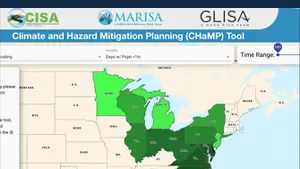 The Climate Hazard and Mitigation Planning (CHaMP) online tool is an interactive website designed to: (1) communicate potential vulnerabilities to the public and authorities responsible for allocating resources for hazard mitigation activities; and (2) help local hazard mitigation, infrastructure, and land use planners integrate climate information into their hazard mitigation and other planning efforts.
The Climate Hazard and Mitigation Planning (CHaMP) online tool is an interactive website designed to: (1) communicate potential vulnerabilities to the public and authorities responsible for allocating resources for hazard mitigation activities; and (2) help local hazard mitigation, infrastructure, and land use planners integrate climate information into their hazard mitigation and other planning efforts.
CHaMP provides users with a single point of access to county-, state- and region-specific historical climate and hazard data and projected climate information. Organized around climate hazard themes, the tool displays climate metrics, hazard data, and hazard impacts in a visual format with downloadable data visualizations and tables that are accompanied by explanatory text.
CHaMP is intended to be a timely and durable resource for historic and future climate information linked to natural hazard data. This report provides users with contextual information and guidance to support Version 1.0 of CHaMP which covers the states of New York, New Jersey, Pennsylvania, Maryland, Delaware, Washington D.C., Virginia, North Carolina, South Carolina, West Virginia, Ohio, Indiana, Illinois, Michigan, Wisconsin, and Minnesota.
Click here to view the resource.




